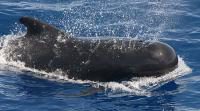 Around the world, pollution is a serious threat to whales. Ironically, on the Faroe Islands, pollution may help to curtail whaling, where protests have failed. The residents of the Faroe Islands in the North Atlantic have been hunting pilot whales for almost a thousand years, since about the time of the first Norse settlements on the islands. The yearly hunt has been the subject of considerable controversy for some time. The Faroe islanders argue that the pilot whales are not endangered and that the hunt is wholly sustainable. Protests against the hunt have hardened the resolve of many on the islands to continue it.
Around the world, pollution is a serious threat to whales. Ironically, on the Faroe Islands, pollution may help to curtail whaling, where protests have failed. The residents of the Faroe Islands in the North Atlantic have been hunting pilot whales for almost a thousand years, since about the time of the first Norse settlements on the islands. The yearly hunt has been the subject of considerable controversy for some time. The Faroe islanders argue that the pilot whales are not endangered and that the hunt is wholly sustainable. Protests against the hunt have hardened the resolve of many on the islands to continue it.
This year, as in years past, protesters from Sea Shepherds have been arrested for attempting to interfere with the hunt. Other conservation groups, notable WDC, Whale and Dolphin Conservation, have abandoned the confrontational approach taken by the Sea Shepherds, who are best known for their reality TV show. WDC state on their website:
In recent years our campaigning against the hunt has taken a lower profile in the belief that overt and vociferous public pressure has only encouraged the hunts to continue and actually increase in response to public outcry. However, our more recent engagement with communities and authorities in the Faroe Islands has shown some potentially promising ways forward as we continue to seek solutions through a better understanding of these practices, and engagement with likeminded grassroots coalitions in the Faroe Islands. No level of hunting is acceptable to WDC, and we continue to seek new ways to stop this practice.
The record of whaling in the Faroe Islands dates back to 1298 and detailed records of the yearly hunt, known as the grindadráp in Faroese, have been maintained since 1584. The hunts are non-commercial and are organized on a community level. The whale meat and blubber is shared for community consumption. Elin Brimheim Heinesen, in her blog A Self-Proclaimed Faroe Islands Ambassador, provides perspective on the islander’s view of the hunt:
It is hard for outsiders to understand that this long lasting food providing tradition – unbroken in more than a thousand years – was one of the main sources of nutritional food for the Faroese up until only a generation ago. That is why pilot whale meat still is just as ‘natural’ for most Faroese to eat, just as burgers are for Americans – and just as difficult to abandon.
I do not want to get into an argument here whether the practice of pilot whale killing is any better or worse than the practice of mass breeding domestic animals for food, but people in the Faroes fail to see that meat from the farm industry in other countries could be any better than the meat they are used to eat….
Bottom line is that people still need food to survive. Hunting and killing not endangered animal species, living in and around the local environment – as untouched by human hands as can be in the world today – still seems to be a better way to provide food for the Faroese in a sustainable way, much less polluting in itself than industrial agriculture or transportation of imported food from far away, is.
The Faroe islanders may be reconsidering the pilot whale hunt for reasons having nothing to do with the protests. The whale meat itself may no longer be fit to eat. The WDC notes:
Pilot whales in this region – the main species targeted – carry high levels of mercury and persistent organic compounds in their meat and blubber. Long term independent studies of children in the Faroe Islands have directly linked neurological delays, cardiovascular problems and other development problems to their mothers pre-natal consumption of whale meat. In addition, recent studies have shown a direct link between the occurrence of Parkinsons disease in Faroese adults and eating pilot whale meat. Despite this, the hunts and consumption continues.
In 2012, Pál Weihe and Høgni Debes Joensen of the Faroese Department of Occupational Medicine and Public Health formally recommended that from a human health perspective, pilot whale should no longer used for human consumption.
In 2012, WDC and a number non-governmental organisations issued a statement addressing human health and the Faroese hunt.
It would be a great irony, if pollution, a major threat to whales worldwide, helps to curtail the Faroe Islands pilot whale hunt.

Pingback: Travel News / Will Pollution Limit Faroe Island Pilot Whale Hunts?